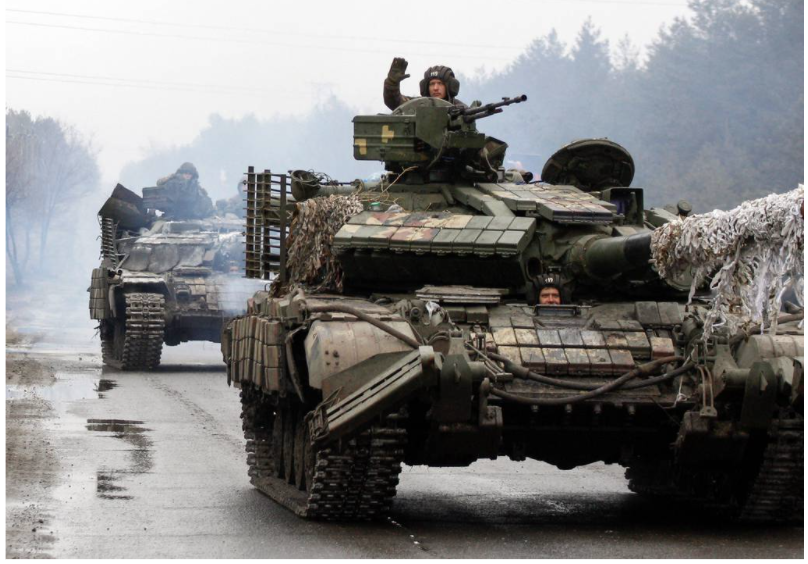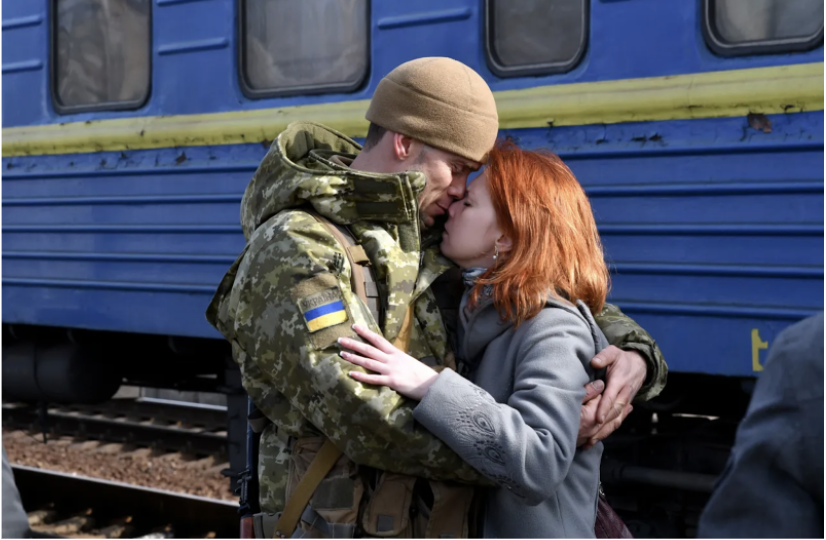Expert Conversations: Panel on Ukraine
Ukrainian servicemen ride on tanks towards the front line to meet Russian forces in the Lugansk region of Ukraine on Feb. 25, 2022. Photo: Anatolii STEPANOV / AFP
Ukrainian servicemen ride on tanks towards the front line to meet Russian forces in the Lugansk region of Ukraine on Feb. 25, 2022. Photo: Anatolii STEPANOV / AFP
Key Points
The current Russian invasion of Ukraine is different from previous invasions and signals a political shift for both countries
Explanations for Russia’s invasion involve domestic costs, questions of Russian security, and Putin’s authority as a leader
Many Ukrainian people are currently unable to leave their homes, revealing the immense human costs that the invasion is taking on Ukraine and its citizens
Summary
On March 25, 2022, 9:30 a.m. EST, the NYU Student Government Assembly, along with the Jordan Center for the Advanced Study of Russia, the Department of History, the Center of European and Mediterranean Studies, and the Graduate School of Arts and Science hosted a virtual panel discussion on recent developments in Ukraine. This panel included experts in the field, Professor Stephen G. Gross, Joshua A. Tucker, Natalia Levina, Anne O'Donnell, and Hadas Aron. The discussion, which included the political, economic and human dimensions of Putin’s invasion of Ukraine, was introduced by Christopher Van Denmark, a senator from the Graduate School of Arts and Sciences at NYU.
Joshua Tucker, Professor of Politics at NYU and Director of the Jordan Center for Advanced Study of Russia began the discussion by outlining the framework for why Russia decided to engage Ukraine. He outlined that the three main reasons Putin invaded Ukraine were Putin’s thoughts about Russian security, domestic politics, and his legacy as a leader. Tucker expanded upon his first explanation, citing the idea of Ukraine joining NATO as the final straw for Russia, as this could reset the global security framework. His second explanation focuses on domestic politics and Putin as an autocratic leader, detailing that Ukraine moving to the EU presents an alternative path to the people of Russia which Putin does not wish for. The last explanation involves Putin’s legacy and how he wants to see a resolution of the USSR, which is currently threatened by the existence of an independent Ukraine.
Natalia Levina, Professor at the Stern School of Business, gave the panel an emotional perspective of the human costs of the war. Levina is originally from Ukraine and has family that still lives in areas Russia has attacked. She explained the difficulties of leaving Ukraine for many citizens due to expensive costs of travel to nearby countries and unwillingness to leave relatives fighting in the war. She concluded her part of the panel discussion by urging the community to continue talking and supporting Ukraine during this difficult time.
A couple embraces before separating in eastern Ukraine on Feb. 27, 2022. Photo: Andriy Andriyenko / AP
Anne O’Donnell, Assistant Professor of History and Russian and Slavic Studies, gave the conversation a historical perspective, explaining the history Ukraine and Russia share together. O'Donnell agreed with Tucker’s reasons for Russia invading, stating that all explanations were largely rooted in a sense of who the Russian people are. She elaborated that there is a belief among Russia’s elite that Russia belongs amongst the world’s major powers - which has often been denied in the past, further explaining their actions today. O'Donnell then shared excerpts from Russian teaching materials to validate such explanations, demonstrating that the geopolitical relationship between Russia and Ukraine is taught with emphasis on the two country’s mutual responsibility for Russian successes, citing their recent actions as “mechanically copying foreign experiences”. This demonstrates that Russia is trying to convince people that Ukraine is going against their previous success and siding with foreign powers.
Stephen Gross, Associate Professor of History and Director of Center for European and Mediterranean Studies, shifted the conversation to speak on the effects of the invasion in Europe and within the European Union. Gross detailed that Europe as a whole is changing its politics due to the invasion, citing the Chancellor of Germany who spoke of “entering a new era.” Gross highlighted that European identity has always been historically constructed with an enemy in play, and since Russia is now becoming the “foe,” they represent a new clear and present enemy in Europe. Gross also noted that the invasion has made Europe realize they live in a different world than as previously thought, causing them to take unusual action, such as sending more aid to Ukraine and increasing military spending.
Hadas Aron, a Faculty Fellow in the Center for European and Mediterranean Studies, concluded the discussion by elaborating on why this invasion is different from prior invasions. She gave the audience background on how Russia has been an aggressor for a long time and invaded Ukraine previously in 2014. Nonetheless, she differentiates this invasion from others by claiming, "If I was asked if Europe would care about an invasion of Ukraine before this, I would have said no,” emphasizing that due to Ukraine's nation-building actions over the years and strengthening national identity, it is easier for Europeans to deem recent developments as more dangerous. Overall, Russia’s invasion of Ukraine in February is unfolding in a very unique manner, especially due to enhanced communication from Zelensky and signaling within Europe to distinguish the situation as different from previous circumstances and reveals fundamental changes undergone by both Russia and its victim, Ukraine.
This report was compiled by Alexis Tretschok on March 30, 2022, and edited by Sophie Slade.


